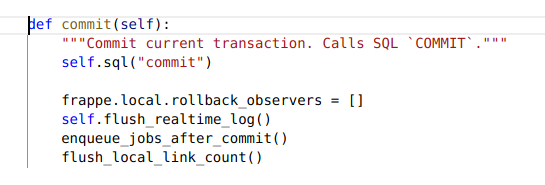I have server-side code that processes an imported list of several thousand product items.
The process involves creating warehouse locations and then material receipt stock entries for each item.
It skips creating a warehouse location that already exists.
If I execute the code with stock entry creation enabled then it fails after the first successful stock entry, with:
frappe.exceptions.ValidationError:
Warehouse Lethal Widget - LSSA is not linked to any account,
please mention the account in the warehouse record
or set default inventory account in company My Company.
On the other hand …
If, (after reverting the database), I execute the code with stock entry creation disabled then all the required warehouse locations get created correctly.
Then, if I enable stock entry creation and rerun the same script, all the required stock entries get created correctly.
Here’s the code:
def createStockEntryForLocation(item, numbers):
LG("Create {} item stock entry for location :: {}. ({})".format(len(numbers), item.legacy_code, NAME_COMPANY))
whs_name = "{} - {}".format(item.legacy_code, ABBR_COMPANY)
try:
existing_warehouse = frappe.get_doc('Warehouse', whs_name)
LG("Location '{}' already exists".format(existing_warehouse.name))
except:
new_warehouse = frappe.get_doc({
'doctype': 'Warehouse',
'warehouse_name': item.legacy_code,
'parent_warehouse': "{} - {}".format('Illegal Widgets', ABBR_COMPANY),
'company': NAME_COMPANY,
'account': "{} - {}".format('1.1.5.06 - Contraband', ABBR_COMPANY),
'warehouse_type': 'Illicit'
})
new_warehouse.save()
new_warehouse.submit()
aWarehouse = frappe.get_doc('Warehouse', whs_name)
aWarehouse.reload()
LG("Have location. Creating '{}' item Stock Entry for {}".format(numbers, aWarehouse.name))
if True:
createStockEntry(frappe._dict({
'serial_numbers': numbers,
'warehouse_name': aWarehouse.name
}))
I’m guessing that scheduler tasks need to be run when a new warehouse is created, and so it’s obligatory to delay before creating any dependent artifacts.
Is that how it works?
What’s the best way to work with this?
